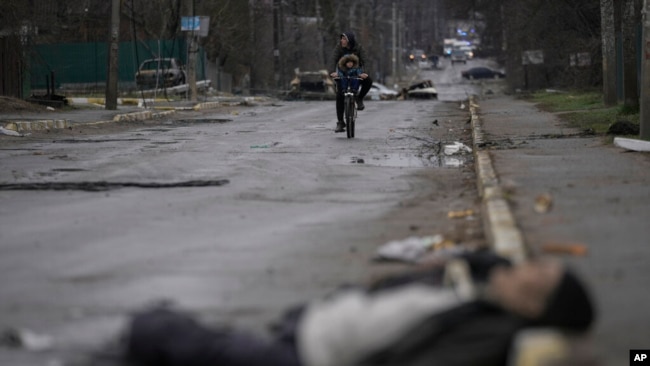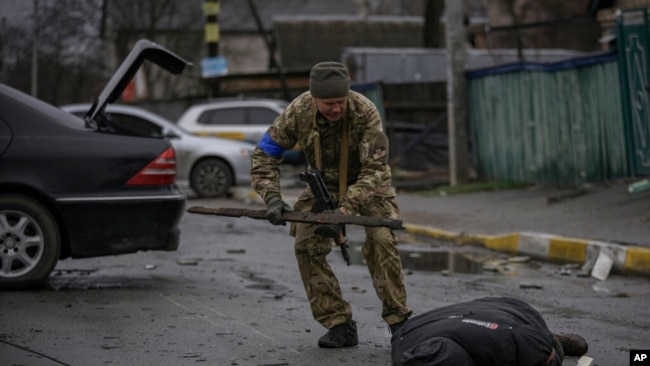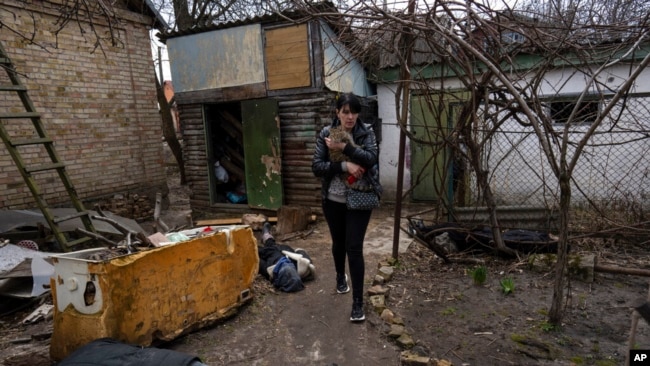[ad_1]
The horrific images and stories that are flooding after the withdrawal of Russian forces from Ukrainian cities, such as the city of Bucha, testify to a degradation reminiscent of barbarism in Cambodia, the Balkans, or during World War II.
The question arises – what to do after these sufferings?
After Ukrainian officials announced that more than 400 civilian bodies had been discovered so far, voices calling for accountability, accusations and punishment were added to the highest levels of Western political power. On Monday, Ukrainian President Volodymyr Zelensky denounced the killings as “genocide” and “war crimes,” and US President Joe Biden said Russian President Vladimir Putin was “a war criminal” to be tried.
But the road to holding the Russian president and other senior leaders criminally accountable is long and complex, warn international law jurists.
“Certainly the discovery of bodies carrying execution marks, such as bullet wounds to the head, represents strong evidence of war crimes,” said Clint Williamson, who served as the United States ambassador to war crimes cases during 2006. 2009.
“When victims are found handcuffed, blindfolded and with clear signs of torture or sexual assault, the case becomes even more compelling. “There are no circumstances in which these actions can be allowed, either if the victims are civilians or if they are senior military personnel,” he added.
There is no reason to believe that the Russians will succeed in war crimes. Russia’s Defense Ministry said Sunday that “not a single civilian has faced violence by the Russian military,” and Russian Foreign Minister Sergey Lavrov described the scenes around Kiev as “a staged anti-Russian provocation.”
The International Criminal Court, which usually charges only a limited number of high-ranking officials, has already launched an investigation into atrocities in Ukraine. Ukrainian prosecutors have launched thousands of criminal investigations, while prosecutors in Poland, Germany, Lithuania, Latvia, Estonia, France, Slovakia, Sweden, Norway and Switzerland have opened their own investigations. Calls have also been added to set up a special tribunal to investigate Russia for the crime of aggression in Ukraine.
To raise a criminal case for war crimes, prosecutors must gather forensic and ballistic evidence, as would be the case in any homicide, to determine the cause and circumstances of the victims’ deaths. They must also prove that the crime took place in the context of an ongoing armed conflict, which is clearly the case in Ukraine.
To raise a case for crimes against humanity, prosecutors must also determine that the crimes were part of widespread and systematic attacks on civilians, demonstrating similarities in the ways people were killed in Butcha, Motyzhyn, Irpin and other cities.
Next comes the more difficult task of determining who is responsible, creating a chain of evidence linking crime scenes to top civilian or military leaders. The first link in this process is often to understand which forces were present when atrocities occurred and who commanded them.
“If you want to look at the chain of command and the perpetrators, it’s important to analyze and gather information about which units were there,” said Andreas Schuller, program director for International Crimes and Accountability at the European Center for Constitutional and Human Rights in Berlin. “You need evidence that connects the entire military apparatus. “Secret documents may be leaked, or witnesses may speak to uncover internal operational planning.”
Raising the issue to the top – to hold Putin and other leaders individually responsible for war crimes or crimes against humanity – will be difficult, legal experts say.
“You have to prove that they knew, or could, or should have known. “, says Philippe Sands, a renowned British lawyer and professor at University College London. “There is a real danger that only middle-level people will be tried in three years, and the main culprits in this horror – Putin, Lavrov, the Minister of Defense, the intelligence services, the military and the financiers who are supporting them – will escape trial. ”.
It would be easier for President Putin to be tried for the crime of aggression, that is, the act of waging a ruthless and unprovoked war against another country. But the International Criminal Court has no jurisdiction over Russia for the crime of aggression, because Russia, like the United States, is not a signatory.
In March, dozens of prominent lawyers and politicians, including Ukrainian Foreign Minister Dmytro Kuleba and former British Prime Minister Gordon Brown, launched a campaign to establish a special tribunal to close this legal loophole and prosecute Russia for the crime of aggression in Ukraine.
Negotiations are ongoing on how to establish such a tribunal so that it has broad legitimacy, either through an international body such as the United Nations or under the auspices of a group of individual states. The Nuremberg tribunal was set up by the Soviet Union, the United States, the United Kingdom, and France to hold the Nazis accountable after World War II.
Mr Sands, who also supports the initiative, said that whatever their legal weight, the images emerging from Ukraine strengthen the political will needed to hold Russia accountable.
“It simply came to our notice then. And I think that’s the way the law works. The law does not govern. “The law follows realities, images and stories, and that is what makes things happen,” he said.
““The worse the horrors on the ground, the more calls I get to set up an aggression tribunal.” he added. ““Governments are under a lot of pressure to do something.”.
But even greater political change may be needed to condemn President Putin in a meaningful way. Trials in absentia are not allowed in the International Criminal Court, and even if a special court were to be set up to try Mr Putin in absentia, a trial without a present author could sound empty.
““I’m really trying to see how there can be a credible defense to the evidence we are proving.” said Alex Batesmith, who has served as a United Nations prosecutor in Kosovo and Cambodia and is now a professor at Leeds University Law School. “But there is no chance that Putin will surrender to the ICC or be arrested and brought to the ICC without major intercontinental conflicts or internal political changes in Russia that do not seem credible.” / VOA
top channel
[ad_2]
Source link


















